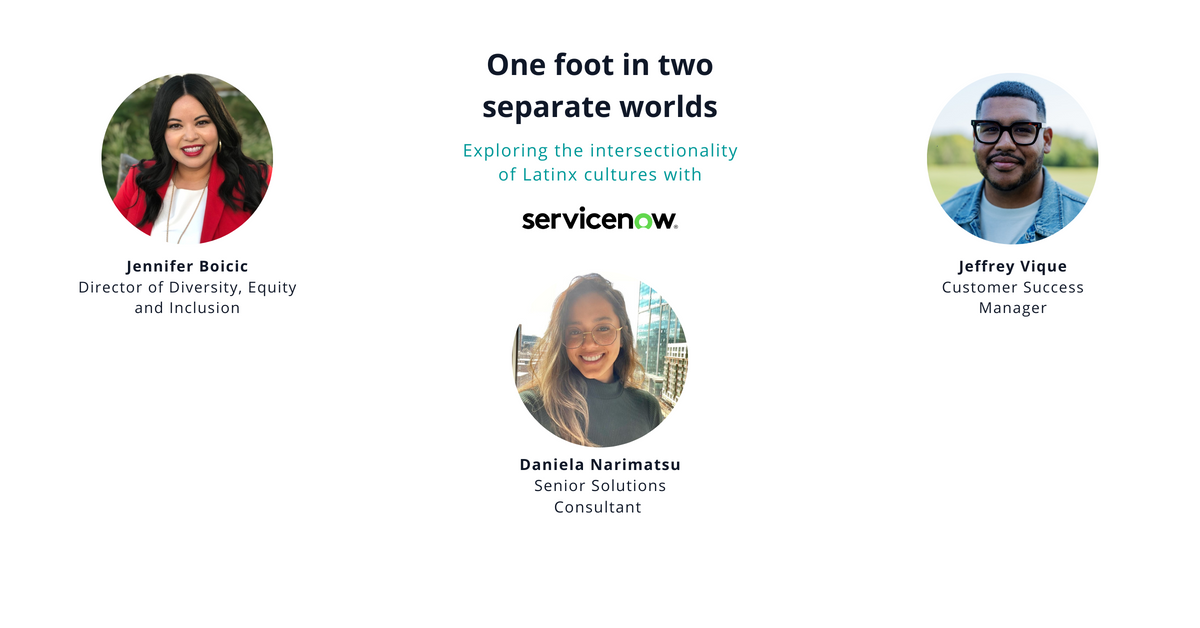ServiceNow is making the world work better for everyone by delivering digital workflows that create great experiences and unlock productivity for employees and businesses of every size. As a company, they understand the importance of building diverse teams with unique experiences and creating a place for belonging so that every voice can be heard.
At our Diversity of Latinidad summit, we invited three Latinx leaders from ServiceNow to share their perspectives on the intersectionality of Latinx cultures and how they’ve experienced having one foot in two separate worlds: their country of heritage and the US.
On the panel were Jennifer Boicic, director of diversity, equity, and inclusion (DEI), Daniela Narimatsu, senior solutions consultant for LATAM and operations lead of the company’s Employee Belonging Group (EBG), Unidos at ServiceNow, and Jeffrey Vique, customer success manager as well as marketing and communications lead for Unidos at ServiceNow.
Here are our biggest takeaways from the discussion.
The diversity of Latinx culture
To say that Latinx culture is diverse would be putting it lightly. The individuals on our panel all come from different backgrounds. Jennifer is of Peruvian heritage; Daniela was born and raised in Brazil, and Jeffrey is a first-generation American with Colombian roots — each one has a different story.
“Being Brazilian is a very unique experience because we don't grow up speaking Spanish,” says Daniela, who is also of Japanese descent. “While we have so much in common with other Latin American countries, Brazilians speak Portuguese, so we develop some differences, such as our music and how we express ourselves. When we come to the US, we're put in one bucket with all Latino countries, despite each having an extremely rich and unique culture.”
Jennifer adds, “People don't even realize that we have so much diversity and history in Peru, especially on the Asian side. At one point, we had a president who was Japanese. We're not a monolith as Latinos, and we have a wide range of diversity amongst all the countries represented as part of Latin America.”
Navigating colorism
Jeffrey peels back another layer of the Latinx experience: skin color. “As you can see, I'm a little bit darker [than other Latinos],” he says. “There are times where even within the Latino community, I don't feel like I necessarily belong because I may not be Eurocentric looking like some of my other colleagues.”
“I’m half-Japanese and half-Spanish,” adds Daniela. “My family comes from southern Japan, where people have darker skin.” This is easily understood in Brazil, which is quite ethnically diverse, just like the US. “But, coming to the US, that's not what people see in me. I always get Latina, or I'll get Filipino or Hawaiian. And I have to justify why I look like this, why my family immigrated to Brazil, and why my last name is Japanese.”
While this could be a frustrating experience, Daniela wouldn’t change it for anything. “It helped me embrace more of who I am and my family's journey to get to Brazil.”
Jeffrey, too, looks at it positively. “We all belong no matter what shade of color we are, no matter where we're from, no matter how we were raised or where we were raised. That colorism aspect just adds a bit more spice to me, my experiences, and what I can bring to the table.”
His advice? “As long as you accept that, I think you're doing the whole world a service because they get to know who you are and what you're about.”
Overcoming impostor syndrome
Having intercultural backgrounds has, at times, led both Jeffrey and Jennifer to experience imposter syndrome.
At one point in her career, Jennifer was the only Latina on both her team of sales engineers and across the wider organization. Rather than bowing to the pressure of self-doubt, she found that growing up in two cultures taught her how to cope with impostor syndrome. “I go back to when I was five, and visited my family in Peru for the first time. I was not speaking Spanish for a full day because I probably felt imposter syndrome, but soon enough, I got comfortable in my new environment. I think those experiences help us understand how to overcome that in the workplace.”
For Jennifer and Jeffrey, ServiceNow’s Employee Belonging Groups (EBGs) have been key to helping them deal with impostor syndrome.
“In such a short amount of time, we've had discussions around imposter syndrome as a community and how we should come together to help each other on our career journeys,” says Jennifer.
Jeffrey adds, “What I've learned through many of the DEI efforts at ServiceNow and my involvement in the EBG group is that you have an arm to lean on, a group of people who can inspire you — whether it’s the members themselves or the leadership team. The guests on this panel have inspired me to look back and say, ‘You know what? I do belong. I am supposed to be here.’”
5 ways to find a mentor
If you’re Latinx, maybe you’ve also felt isolated, stuck in your career, or bent under impostor syndrome at times throughout your career. The way forward? All three of our panelists echo the same thing: mentorship.
Here are their five recommendations for making the most of mentorship:
- Reach out to Latinx leadership. “If you're at an organization and you see a Latino leader at VP or executive status, reach out to them,” says Jeffrey. “They probably will say yes,” adds Daniela, “because they're also interested in your experience as much as you are interested in theirs.”
- LinkedIn is your friend. “Look for industries that you're interested in,” says Daniela. “Look for a location, filter for where you are, filter for interests that you might have in common, like volunteering or anything else. You’ll be able to find people that connect with you in all of those different layers.”
- Make the most of Employee Resource / Belonging Groups. “If you don't have an employee belonging group or ERG group, maybe start creating one, or start finding ways to provide a mentorship program,” says Jennifer. “I'm sure you're not the only one who feels that way. And it's an opportunity to get visibility by creating impact within your company.”
- Be open to being mentored by non-Latinx seniors. “Don't be hesitant to reach out to people that don't have a similar journey because reverse mentoring is also really important,” advises Jennifer. “Even if you're early in your career, you have so much to contribute and can share your experience with an executive who may have a very different perspective.”
- Pay it forward. Jeffrey believes that leaders can and should mentor early-career folks. “Embrace the fact that even if you're the only one, you can contribute your own culture into the conversation, which paves the way for many other people,” he says.
Intersectionality as your superpower
Jeffrey, Daniela, and Jennifer all agree that while having one foot in two separate worlds brings a unique set of challenges, it can also be a source of strength.
“Don’t sell yourself short. It never gets easier, but more and more, you’ll get to see that you are qualified for that role,” says Daniela. “We are all extremely hard workers. We know how many times we had to work extra hard to get something that maybe some of our peers didn't have to. And that builds so much of your strength, your character, your determination, and your ambition.”
Jennifer adds, “There's so much I'm contributing by being ‘the only’ because no one else can share the experience that I'm bringing to the table. There is so much power that we bring as Latinos, first-generation or Latino Americans. There's so much power in what we have to contribute by having a voice at the table, even by being ‘the only.’”
For more insight from Jeffrey, Daniela, and Jennifer on topics like navigating when your authenticity is called into question, leveraging your culture to help you advance professionally, and more, listen here for our full conversation, “Ni de Aquí Ni de Allá / Not from Here, Not from There.”
—----------------------------------------------------------------------------------------------------------------------------------
Interested in growing your career with an employer that prioritizes diversity, equity, and inclusion for its employees and is recognized amongst Fortune’s top 25 World’s Best Workplaces? Explore career opportunities with ServiceNow here.




